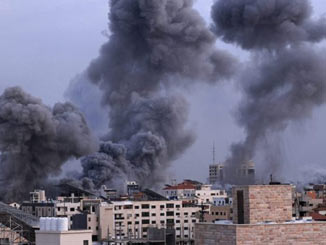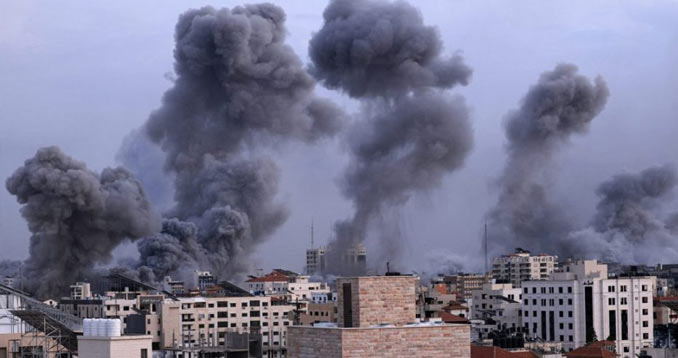

The ongoing conflict between Hamas and the Israeli army continues to claim lives on both sides. The Gaza Strip, which serves as a refuge for Hamas militants, is under bombardment by the Israeli army, which is determined to capture it through a large-scale ground attack. The bombing of Gaza and its siege have triggered reactions from the United Nations, various governments, and some human rights institutions. However, these actions have not swayed the decision of Benjamin Netanyahu’s government. In response, Hamas militants are also targeting certain areas in Israel with rocket attacks. At present, the Israeli army holds a superior position, and unlike the initial days of the war, the number of casualties among Gaza residents is increasing. As of the sixth day of the war, the respective casualties of Israelis and Palestinians have reached 1,300 and 1,417.
Türkiye plays a crucial role in the region and can influence the escalation or resolution of the conflict. To grasp Türkiye’s position, it is essential to examine its relationships with the warring parties to determine whether it aims to maintain a balance or support Hamas.
The Complex Relationship Between the Justice and Development Party Government and Israel
The Justice and Development Party government in Türkiye is a staunch supporter of Palestine in the Middle East, having severed ties with Israel on two occasions. The first instance was when the Israeli army launched a military operation in the Gaza Strip at the end of December 2008, eliciting a strong reaction from Ankara. In late January 2009, then-Turkish Prime Minister Recep Tayyip Erdogan participated in a Swiss summit where he took a harsh stance against Shimon Peres, the president of Israel. Erdogan accused Peres of committing “infanticide,” gaining the appreciation of groups and countries opposed to peace with Israel. Furthermore, in May 2010, an Israeli attack on a ship carrying humanitarian aid bound for Gaza resulted in the deaths of nine Turkish aid workers. In response, Türkiye severed diplomatic relations with Israel and refused to resume them until the Israeli side issued an apology and provided compensation to the victims.
In June 2016, with the mediation of the United States, Türkiye and Israel agreed to restore diplomatic relations. However, in May 2018, a new tension emerged between them due to Israeli military actions against Palestinian demonstrations in the Gaza Strip. This led Türkiye to suspend its diplomatic relations with Israel. Notably, the Israeli ambassador faced a security check upon leaving the Turkish airport, which was considered a diplomatic insult. During this period, when Türkiye hosted a special meeting of the Organization of Islamic Cooperation (OIC) in Istanbul, Erdogan drew a parallel between Israel and the Nazi government, stating, “There is no difference between the oppression that was inflicted on the Jewish people in Europe 70 years ago and the oppression that is inflicted on our brothers in Gaza today.” Additionally, when the United Arab Emirates established diplomatic relations with Israel under the Abraham Accord, Erdogan threatened to cut off diplomatic ties with that country.
The preceding points were discussed to help understand the basis for the strained relationship between the Justice and Development Party government and Israel, primarily focusing on the Palestinian issue, particularly the Gaza crisis. However, in 2022, the two countries established new relations and agreed to exchange ambassadors during the visit of the President of Israel, Isaac Herzog, to Ankara.
The Relationship Between the Justice and Development Party Government and the Hamas Movement
The bond between the Erdogan government and Hamas is, if not stronger than Iran’s ties with the group, certainly no less robust. The key distinction lies in Iran providing arms support to Hamas, a step Türkiye refrains from due to its non-enmity with Israel and its aim to avoid Israel’s destruction. Nevertheless, Türkiye has consistently provided political support to Hamas, even hosting high-ranking leaders. Türkiye has not only supported Hamas but also acted as a mediator between this group and the Palestinian Authority. For instance, in July 2022, Erdogan hosted Ismail Haniyeh, the head of the political office of Hamas, and Mahmoud Abbas, the head of the Palestinian Authority, urging them to maintain unity. Erdogan’s government has endeavored to balance between the two Palestinian factions, despite some Arab countries labeling Hamas as a terrorist group and viewing the Palestinian Authority as the legitimate representative of the Palestinians.
When Sheikh Ahmed Yassin, the founder of Hamas, was killed by the Israeli military, Erdogan’s government condemned his murder as “state terrorism.” Similarly, Khaled Mashal, one of the leaders of Hamas, attended the General Congress of the Justice and Development Party in September 2012, acknowledging Erdogan not only as the leader of Türkiye but also as the leader of the Islamic world. Even when Türkiye decided to resume relations with Israel, it did not comply with Israel’s request to expel Hamas leaders from its territory, although Türkiye might have imposed partial restrictions.
Statements of Turkish Officials Regarding the Gaza War
At the onset of the conflict between Hamas and Israel, Erdogan adopted a benevolent and neutral stance, urging both parties to exercise restraint, protect civilian lives, and work toward peace. However, as Hamas found itself in a weakened position and the Israeli army intensified its siege and bombardment of Gaza, there has been a shift in Türkiye’s position. Erdogan now emphasizes the need to safeguard the lives of Gaza’s residents and lift the blockade in the region. He has expressed deep concern about the presence of a US aircraft carrier in the area, warning that its use could lead to a “massacre.” It’s noteworthy that Türkiye’s tone on the Gaza crisis is stronger and less tolerant compared to many Arab countries, despite Türkiye not being an Arab nation.
Furthermore, Erdogan held a detailed conversation with Russian President Vladimir Putin regarding the Gaza crisis. Russia, a staunch rival of NATO and the European Union, ironically labeled the Gaza war as a consequence of America’s misguided and unilateralist policies. Erdogan also spoke with Mahmoud Abbas, the head of the Palestinian Authority. Simultaneously, Türkiye’s Foreign Minister, Hakan Fidan, had a phone conversation with Palestinian Authority Foreign Minister Riyad al-Maliki and Iran’s Foreign Minister Hossein Amir-Abdollahian about the Gaza war and potential solutions.
Public sentiment in Türkiye aligns with supporting the Palestinians. Even Kemal Kilicdaroglu, the leader of the Republican People’s Party and Erdogan’s political opponent, implicitly expressed his backing for the Palestinians, urging an end to the war. Additionally, Ahmet Davutoglu, Secretary General of the Future Party and former Turkish Prime Minister, unequivocally supported the Palestinian cause.
Maintaining Balance or Supporting Hamas?
Initially, Türkiye’s objective is to uphold a balanced policy. This is because Türkiye needs Israel and cannot risk its relationship with the country due to its support for Hamas, unless circumstances make it unavoidable, as it happened in 2010 and 2018. Additionally, Türkiye is a member of NATO and is striving to join the European Union. Member countries of these organizations strongly support Israel and do not tolerate hostility towards it. Türkiye faces significant challenges with Armenia and Greece, with active Greek and Armenian lobbies in the Western world working to isolate Ankara. Consequently, the Turkish government refrains from confronting Israel, which has more potent lobbies than Armenians and Greeks in the US and Europe. Striving to maintain a balanced policy compels Türkiye to act as a mediator, akin to its role in signing the grain contract with Russia.
On the other hand, Türkiye staunchly advocates for the establishment of a Palestinian state within the pre-1967 borders—an idea supported by the United Nations and many other countries globally. Yet, no unified action has been taken to persuade Israel in this regard. The lives and survival of Hamas and the Palestinians, enduring Israeli airstrikes, are paramount to the Erdogan government. If the blockade of Gaza persists and the bombings continue, Türkiye’s efforts to maintain balance will cease, and it will incline towards supporting Hamas. Historically, the severance of relations with Israel twice in the past was directly linked to the Gaza conflict. Furthermore, recent statements from Turkish officials indicate a leaning towards supporting Hamas.
Moreover, Türkiye’s relations with Arab countries, previously strained, have improved. Erdogan’s visits to Saudi Arabia and the UAE have paved the way for better relations. Türkiye has also re-established diplomatic ties with Egypt after a 13-year hiatus. This means that Türkiye will not be isolated in the event of a strained relationship with Israel. The regional powers that were once rivals are now on Türkiye’s side. However, Ankara’s strong reaction against Tel Aviv will likely be limited to verbal tension and a reduction in the level of diplomatic relations, rather than military intervention or armed support for Hamas.
جنگ غزه و موضع ترکیه؛ حفظ موازنه یا حمایت از حماس؟

Leave a Reply